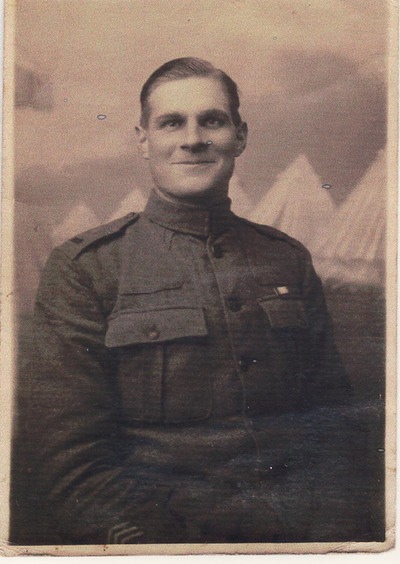Arthur’s war began with his enlistment, which seems to have been in October 1914. He enlisted into the Army Service Corps (ASC) and was attached to the 19th (Western) Division. His army service number was 024042, and his rank was Driver.
Following his enlistment, Arthur was given basic training, ahead of his departure for France. His training seems to have lasted for some ten months, between October 1914 and July 1915.
July 1915
Advanced parties of the 19th (Western) Division left for France on 11th July 1915, with the main body making the Channel crossing between the 16th and 21st July. Arthur’s medal roll records his departure date as 21st July (a Wednesday), though in his first letter (undated), written on 19th Divisional Train notepaper, he says: “...we are leaving for France Saturday”.
Units of the 19th (Western) Division initially moved to the point of assembly near St Omer, France. Among the thousands of assembling troops was 18-year-old Driver Arthur Horsnell, whose job was to drive the supply vehicles – probably horse-drawn vehicles – of the ASC 19th Divisional Train.
August 1915
Writing from the Base Horse Transport Division at Le Havre, Arthur mentions that he is paid "20 francs a fortnight – 1 franc counts as 10d [ten pence] so you can guess what we get” (the equivalent of 16 shillings and 8 pence). “That isn't so bad,” he says.
September 1915
By late September, Arthur had moved away from the base at Le Havre and was “nearer the line”. It’s raining and the ground is a “good mess”. He asks for thick socks and the Essex newspaper, and has received tobacco from a school in England. The school enclosed a self-addressed postcard with the tobacco, which Arthur used for his reply.
October 1915
Requests for buttons – "them what don't come off” – and a “good big scarf” for the winter. The socks Arthur asked for in September have arrived, and with Christmas approaching there’s talk amongst the men of forming a football, rugby or boxing club. The "old French women … work a damn site harder than the men” on the land, and if Arthur ever marries he will make "the old woman do all the work … If she says anything I shall say the women in France had to do it in wartime so you have to do it.” No doubt this last comment raised a few eyebrows – and chuckles – in the Doe household.
November 1915
A food parcel has arrived from home, bringing cake and nuts, as has a newspaper – presumably the Essex newspaper requested in September. Arthur’s thoughts turn to Christmas, but he doubts he’ll be spending it at home.
December 1915
The first two weeks of December saw Arthur away from camp, transporting supplies to the troops in the trenches at the front. He looked out for older brother Fred, but saw no sign of him “up there”. As the year draws to an end, Arthur sends Christmas greetings, and prepares to spend his first Christmas away from home and family.
